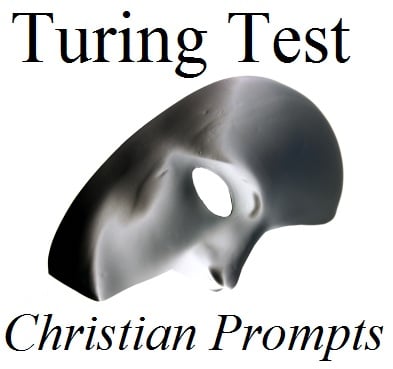This is the eleventh entry in the Christian round of the 2013 Ideological Turing Test. This year, atheists and Christians responded to questions about sex, death, and literature.
Polyamory
I had a philosophy professor once who liked to say, “Always start by making distinctions,” and that’s where I’m going to begin on this issue. Polyamory is an intentionally general term, encompassing both what I’ll call polygamy and what I’ll call group marriage.
Polygamy is found fairly commonly in human history, and it consists of one man being married to multiple women concurrently, or more rarely one woman being married to multiple men. However, a polygamous marriage is really a set of marriages. Tom is married to Sally and Tom is also married to Jane. However, Sally and Jane are not married to each other.
Group marriage has far, far fewer historical precedents. Here the idea is that some number of people larger than two are all part of a single relationship together. Thus, in a group marriage, we would be talking about, say, Tom, Harry, Sally and Jane all being married to each other — Tom just as married to Harry as he is to Sally, etc.
Now, the question is whether sacramental or civil marriage should be limited to the union of two persons. Sacramental marriage is a relatively easy question for us Catholics. The Church has always taught that marriage is the union of two people. As Martin Luther pointed out, the New Testament does not specifically forbid polygamy, however as Catholics we don’t have to restrict ourselves to scripture, we also use sacred tradition, and according to Catholic tradition marriage is monogamous. Obviously, this relies on revelation, but then the existence of sacraments relies on revelation too, so I’m not sure I need to make a case for how one would know this outside of revelation.
Civil marriage is a different issue. I’d like to start that topic by discussing natural law for a moment. Interestingly, in Thomas Aquinas’s discussion of marriage, he holds that natural law does not necessarily forbid polygamy. He lays out a lot of reasons why it would not be a good idea in most circumstances: People are naturally jealous and it would be hard for a person to treat all their spouses equally. In the case of polyandry (a woman with more than one man) it might deprive children of the right to know their real parents (because it might be unclear which husband was the father.)
I’m willing to concede this, but I’d argue that natural law does prohibit group marriage. Marriage is, in great part, supposed to recognize a family unit which consists of two people who have children together and raise them together, and as a matter of human biology a person can only have two parents: one mother and one father. Thus, the unique relationship between parents and children can only be had by two people at a time. In the case of polygamy, Tom might have this relationship with Sally and also have this relationship with Jane, but there is no way that all three could have that relationship together because no child is the product of the union of all three.
Civil marriage brings in a pragmatic question of whether it makes sense for society to recognize a relationship as forming a legal family unit, along with all the legal issues (shared custody of children, community property, etc.) which that entails. I would argue that in a culture where polygamy is common, the state should recognize polygamous marriages and have appropriate laws to govern them. However, it seems like recognizing and having laws to govern group marriages is just too complicated to deal with. Community property in a group marriage would be far too complicated to litigate, and child custody should arguably be done on the basis of actual parentage, which is necessarily always something only two people have.
Euthanasia
I don’t believe that suicide or mercy killing is every moral.
From a Catholic point of view, the argument is relatively simple. We can never will the killing of another person as an end. At times (self defense, war, capital punishment, etc.) it be necessary to take some action which, as a necessary but foreseen side effect, takes a life. But at the most basic level our lives are not our own to end. God gave us life and it is not for us to take away what he has given.
I’m divided on whether I’d say this is discernible without recourse to revelation. On the one hand, our desire to live is one of the strongest desires we have, and so it seems like there could be an argument that if we desire death instead of life, it’s because of some sort of illness or outside pressure upon us. Death is never a natural good.
However, there have been so many cultures which have considered suicide acceptable or even necessary under certain circumstances that it seems to me that if opposition to suicide is discernible through natural law, it certainly seems not to be very readily discernible. Moreover, since the primary reason that I think suicide is immoral is that it rejects God’s gift of life, it seems natural that someone who doesn’t consider life to be God’s gift might disagree and consider life to be something we can dispense with whenever we see fit.
There is, however, a distinction to be made between active euthanasia and not taking heroic methods to drag life on longer. Often people seem to react to this issue as if rejecting euthanasia means that everyone needs to hold on to life by any means necessary, dying in an ICU with shouting doctors all around. While it’s clearly wrong to withhold basic care (food, water, anti-biotics, pain medicine, etc.) I don’t think we’re required to accept medical care which is unlikely to extend life much and will cause a lot of suffering in the meantime. And in a hospice situation, it’s sometimes appropriate to allow amounts of pain killer that increase the likelihood of death, though it would never be right to pick a dosage specifically to guarantee death.
Bonus
This may seem a bit tangential, but it’s what occurred to me after reading the two posts: I think it’s really interesting to compare the classic pagan epics (the Iliad, Odyssey and Aeneid) with the greatest Christian epic, Dante’s Divine Comedy.
The Iliad and Aeneid close very explicitly with death. In the Iliad, Achilles (whose own immanent death if known to the audience) finally has pity on the mourning father of Hector and turns over the body of Hector for burial. In the Aeneid, the very last action is Aeneus plunging his sword into an enemy whose “soul rushed out through the wound”. The Odyssey is somewhat less bleak in that Athena shows up to stop a bloody vendetta between Odysseus and the suitors that he slaughtered, thus ending a cycle of violence. Even so, the closing atmosphere of all of these is dark, and death is the ending.
The Divine Comedy, on the other hand, deals in a certain sense all through with death: Dante is guided through the afterlife. But the real topic is rejecting sin and learning virtue. As he tours hell, Dante learns the true nature of sin. As he climbs mount purgatory he is schooled in virtue. And the Paradiso ends with Dante contemplating God himself, an experience he says his poetic powers are completely insufficient to express.
The pagan epics relate adventures (the wrath of Achilles, the wanderings of Odysseus, the founding of Rome) but end in death or at best truce. Dante’s Christian epic deals with suffering and conversion and ends in the contemplation of God. As such, they deal with fundamentally different types of journey and types of struggle, and I think thus underline the essential difference of the Christian worldview from what came before.
You can vote on whether you think these answers were written by a Christian or an Atheist here. Comments are open to discuss the substance of the post and for speculation about the true beliefs of the author, so please vote before looking at the comments.












